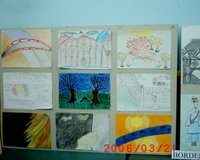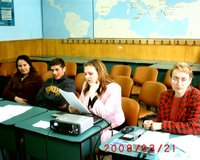The prose writer and contemporary dramatist, Marian Ilea, who was awarded numerous national and international, literary prises, published (among many other books), a trilogy which contains Gravimeter, The House of Gorki Market and Vacek.
The central idea promoted in this trilogy is that of transfrontier between social spheres, cultures, and ethnics. This is introducing the idea of borderline, between the characters, what they are and what they want to be.
In the same time, it is revealed the cult of shame/guilt.
The trilogy is structured in two sections. At first the story is narrated in a classic form, in a burlesque way and finally, using the “balzacian” pattern. The trilogy contains dramas, inspired from “Realia and Utopia” areas. It is achieved through meditation. The author explores the paradox, providing an appearance of normality.
By analysing the setting of the novel, we can notice in its development different places. This way, Medio Monte becomes an “axis mundi”, around which the characters gravitate in an inevitable way. At first they experience different states from calmness and tranquilli to that of machinery characteristic to all the inhabitants.
The faun seems to be contaminated by a germ of intimations, send out by the town Council. Denouncing has a sotheriologycal function, just like a purgatory, which allows the envy, the abnormality or the obscure, to insert entirety.
One of the lait-motives of this trilogy is represented by a vision, from dream-weak up status, of its own burial, to the author’s opinion about the voice of community, (the cult of shame) in this situation.
The narrative plans appropriated to this trilogy are separated in three plans, alternative, parallel and, even in some cases, over loped.
As to chronology, it follows a linear trajectory, with many regressions, all this in a blend of reality…, fiction and dream, in which they aren’t elucidated the metafictional fragments.
Medio Monte becomes the main character, built up on an archetypical manner, situated “at the middle of Good and Evil”. It embodied the premonition, (animal diseases, lost minded miners, who get out, or not from the mine-exploitation).
Vacek Syrovy, the chief policeman, from Medio Monte, is one of those, who have hallucinations, related to an Idea. Along the story, we can notice that the chief policeman seems to be deeply inflexible, when searching the source of all the evils, which had happened in Medio Monte. He thinks that bishop Joseph Kollowitch, is behind all the delinquencies and crimes that took place in Medio Monte.
Vacek Syrovy, the chief policeman, from Medio Monte, is one of those, who have hallucinations, related to an Idea. Along the story, we can notice that the chief policeman seems to be deeply inflexible, when searching the source of all the evils, which had happened in Medio Monte. He thinks that bishop Joseph Kollowitch, is behind all the delinquencies and crimes that took place in Medio Monte.
By reading the book, we can find out “Bakeries with an aspect of latrines […] Merchandises are fully covered with ledges”, all this representing images that really reach an apocalyptic level, that have the role of destroying the Medio Monte natural paradise. In this way, the statues of the market, this attributes is due to the invasion of the Galatians and the Albanians, all protected by Felicia Gruntag, colonel Rady`s widow.
“Vacek” represents an agony book. It` s the agony of an imaginary, well hold up, by the writer. The characters are reporting, themselves to the Great Mechanism, just as to a great religion. One of these characters will die, another one will escape from being marginalized, going by train to Brno. Hereby “Vacek” is a frothy book, irrational and hilarious sometimes, producing a carnival “topos”, where beneath the surface, it can be noticed a large series of funny, tragic-comic situation, and the surface structure of the text, on a second thoughts, is defined by bizarre situations, a-typically, un-centrated epic contexts.
“Vacek” represents an agony book. It` s the agony of an imaginary, well hold up, by the writer. The characters are reporting, themselves to the Great Mechanism, just as to a great religion. One of these characters will die, another one will escape from being marginalized, going by train to Brno. Hereby “Vacek” is a frothy book, irrational and hilarious sometimes, producing a carnival “topos”, where beneath the surface, it can be noticed a large series of funny, tragic-comic situation, and the surface structure of the text, on a second thoughts, is defined by bizarre situations, a-typically, un-centrated epic contexts.
This book can be easily described, according to the obvious paradox, in each manifestation of the genuine human being.
Costin Alexandru - Daniel, XI G
Costin Alexandru - Daniel, XI G


